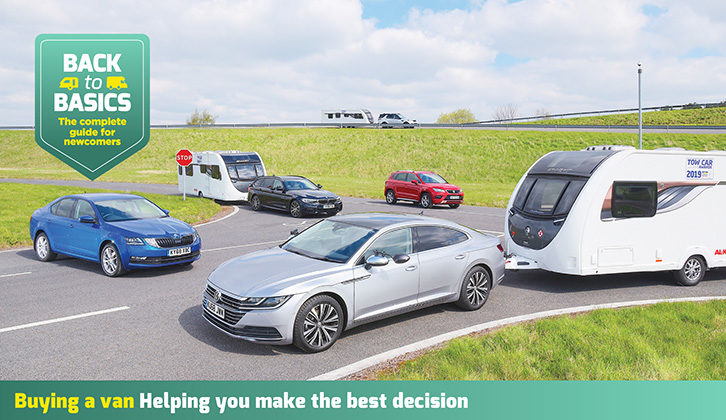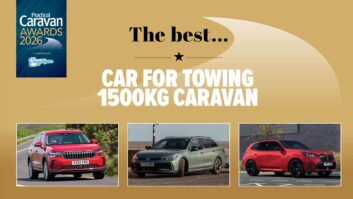Towing is one of the toughest tests a car will ever go through. The school run, commute and weekly shop pale in comparison to pulling a 1.5-tonne home-from-home for hundreds of miles. The tricky part is judging whether a particular vehicle will handle towing, just from looking at the spec sheet and taking a brief test drive. Our regular tow tests are a good place to start, but we can’t cover the whole market. Whether you’re thinking of buying a car online or getting your vehicle in the metal, we’ll talk you through to look for when you want to choose the best tow car for you.
The basics of choosing a tow car
If you’ve been towing for a while, you’ve probably heard all of this before, but there are guidelines to follow when matching car and caravan. Some are inked into law, some are more rules of thumb. To stay legal, the car you tow with must have a legal towing limit that matches or exceeds the loaded weight of your caravan. So if your caravan weighs 1500kg, you need a car with a towing limit of at least 1500kg.
A car’s legal maximum is based on its ability to tow a trailer up a slope repeatedly, so it shouldn’t be assumed that because a car can legally tow, say, 2500kg, it’s going to be wise to tow something that heavy at 60mph on the motorway on a windy day.
For the sake of stability, both major caravanning clubs recommend towing no more than 85% of the kerbweight of the tow car. You can usually find the kerbweight online or in a brochure, although some carmakers make it easier to track down than others. To find the maximum weight of caravan you can tow and abide by the 85% guideline, take the kerbweight and multiply it by 0.85. For example, a 1700kg car has an 85% match figure of 1445kg.
Both of the big clubs consider it acceptable to tow up to 100% of the car’s kerbweight provided you are an experienced tow car driver, but neither recommend a matching ratio of more than 1:1.
If you already have a caravan and you’re looking for your next tow car, work the maths the other way around.
Divide the caravan’s maximum fully loaded weight (the Maximum Technically Permissible Laden Mass or MTPLM on the weight plate) by 85, then multiply by 100 to get the minimum weight of tow car.
The qualities of a good tow car
You’ve found a handful of cars you like the look of. They have a high enough towing limit to make a legal match for your caravan, and a kerbweight that’s sufficient to suggest stability will be acceptable. You’ve checked the MAM of car and caravan and your licence covers you to drive this combination. Which car will do the best job of towing?
Stability is the most important quality you can look for in a tow car, and one that’s frustratingly difficult to judge purely from the specification. But there are indications to take note of, from the tech specs and the test drive.
Have a look at the vehicles on your shortlist. Are any significantly heavier than the others? If one car weighs a lot more than the rest, there’s a good chance it will be more stable when towing your caravan, as the matching ratio will be more favourable – think big dog, small tail. One stat that’s easy to overlook is the noseweight.
The higher the noseweight limit, the better. It will be at least 4% of the legal towing limit by law, but closer to 7% will generally make for a more stable tow.
The test drive can also be revealing, even without the opportunity to tow a caravan. Ideally, you are looking for firmly controlled ride. Does the car deal with dips and crests quickly and decisively, or does it float and wallow?
Does the suspension recover immediately after a bump, or makes a series of ‘bounces’ before regaining composure?
Are you looking for the best SUV tow car? People often assume that SUVs are the standout tow cars, but there’s a lot to be said for a low centre of gravity. Don’t rule out an estate as an alternative, as these tend to have their heavy components closer to the road than SUVs, which can make for more stable towing.
Likewise, having four-wheel drive is useful, but not essential. That said, if you plan to tow all year and you regularly stay on grass pitches, the clear advantages of four-wheel drive become even more compelling.
Check if the car is fitted with a trailer stability system, which adapts a car’s electronic stability control for the specific demands of towing. Such systems are well worth having, but won’t turn a bad tow car into a good one.
Self-levelling suspension is another plus, because it keeps the car level with a heavy load in the boot and the weight of a caravan on the towball.
Talking about torque
When it comes to engines, the most commonly used measure is power. For towing, though, it’s torque that really matters. Torque, or twisting force, measures the engine’s ability to perform work. Power measures how quickly the work can be achieved. Think of an engine like a horse. An engine with high peak power is more of a race horse, whereas an engine with lots of torque is like a shire horse. You wouldn’t expect a thoroughbred racer to pull a wagon loaded with hay, any more than you would consider entering a shire horse in the Derby.
So concentrate on the torque figure (which is given in lb ft or Nm) rather than power (bhp, h or PS). The higher the figure, the better, ideally starting from low engine revolutions and delivered over a wide range.
As a rule, diesel engines produce more torque than petrols, so for many years have been the first choice for most tow car drivers. However, efficient turbocharged petrol engines have closed the gap on diesel to an extent, and many hybrids (including plug-ins) have sensible torque figures for towing.
Other considerations when you’re choosing a tow car
When you want to choose a tow car, make sure you don’t neglect its other qualities. Safety, economy, practicality, value – all these things have to inform your final decision. The chances are you will spend a lot more time driving it without a caravan than with one.
If you liked this, why not read these:
- Take a look at our guide to the best used tow cars to find out about some more budget-friendly options you can consider
- Wondering how to pick out the tourer for you? Our guide to how to buy a caravan will help
- We talk you through some of the complex terminology used in our caravan jargon busting glossary
If you want more top towing advice, be sure to take a look at our Back to Basics: Driving section, where you’ll find plenty of top tips to help you stay safe on the road.
If you’ve enjoyed reading this article, why not get the latest news, reviews and features delivered direct to your door or inbox every month. Take advantage of our brilliant Practical Caravan magazine SUBSCRIBERS’ OFFER and SIGN UP TO OUR NEWSLETTER for regular weekly updates on all things caravan related.









